Driver’s view: Why Norfolk grower runs trio of Deutz 7250s
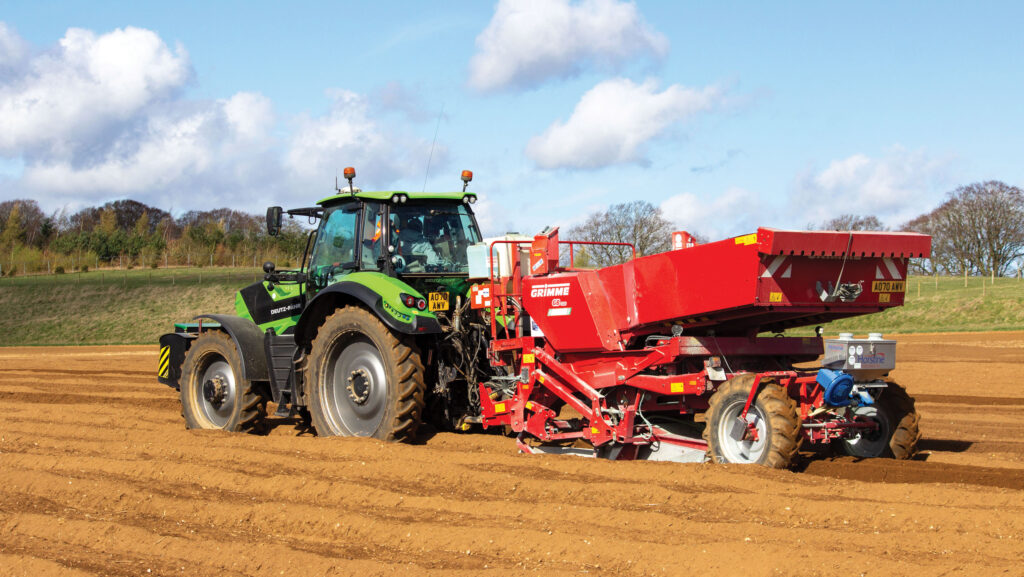 © MAG/Oliver Mark
© MAG/Oliver Mark Deutz-Fahr tractors are now the go-to prime movers for Norfolk-based potato grower Ian Mason Farms, primarily because of their keen up-front costs and driver-friendly controls.
The business runs four of them – three 7250 TTVs and an 8280 – alongside a trio of John Deeres.
One of the 7250s arrived after Deutz revamped its 7 Series in 2021, a process that condensed the firm’s offering around the 250hp mark to just a pair of models.
There’s little to split the two, but for beefier axles and a 1.1t higher lift capacity on the HD version.
Both run the same Deutz TCD 6.1-litre engine tuned to deliver a maximum of 247hp and, more significantly, they now have the “compound”-style driveline of the bigger 8280 (280hp).
This replaced ZF’s ageing, mechanically biased S-Matic stepless transmission and combines hydrostatic drive for smooth, fast acceleration with mechanical elements that provide greater efficiency for field work at high revs.
The man giving us the verdict on the 7250 TTVs is manager Aaron Jarvis of Ian Mason Farms, Kings Lynn, Norfolk.
See also: Driver’s view: Deutz-Fahr 6125 C tractor
Deutz-Fahr 7250
- Year 2023
- Engine 6.1-litre, six-cylinder Deutz
- Max power 247hp
- Max torque 1,072Nm
- Transmission T7560 continuously variable
- Weight 10,475kg
- Rear lift 10,000kg
- Hydraulic pump 160 litre/min
- Wheelbase 2,918mm
- Price paid £142,000 in 2023
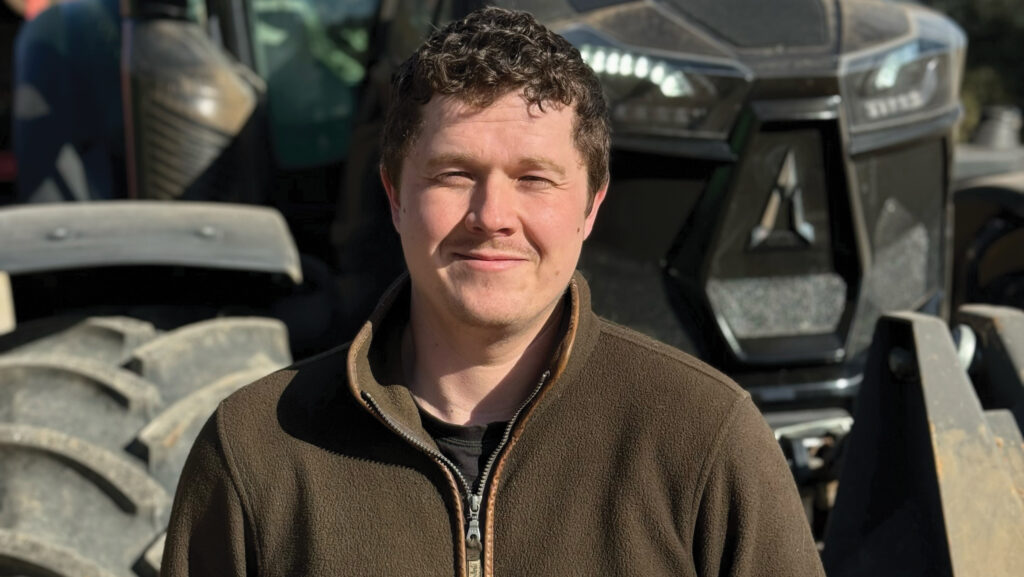
Aaron Jarvis © MAG/Oliver Mark
Why Deutz-Fahr 7250s?
We got our first Deutz, a 7250, eight years ago. The boss fancied giving them a go as they were so well priced for the spec.
Operators get a big say in what tractors they drive – they can pretty much have what they want, within reason – so I guess it’s telling that we now run four Deutz tractors.
Three are Warrior edition 7250s, which we’ve found versatile enough to do pretty much everything, and there’s an 8280 for heavy draft work.
We’ve also got three John Deeres – two 6R 175s and a 6215R – as some of the team prefer a different shade of green.
The newest 7250 arrived in October for £142,000, which was more than £20,000 less than we were quoted for an equivalent Deere.
We also priced up a JCB Fastrac 4220 iCon around the same time and that was going to be £160,000, plus at least another £10,000 for the guidance kit.
We’re of the opinion that there’s not much difference in the cost of ownership between Deutz and Deere – the amount we save on the purchase price is lost in the second-hand value.
We only keep them for about four years/3,000 hours, though. If we were taking them to 10,000 hours then it would probably pay to go for a more popular brand.
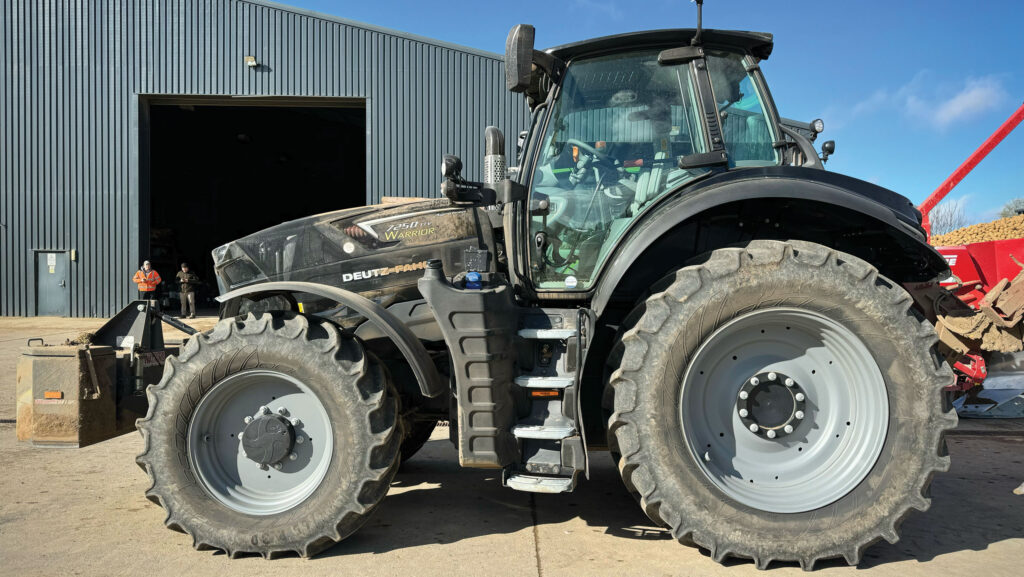
© MAG/Oliver Mark
What extras did you opt for?
They’re all top spec. We like to have the option of swapping them between jobs, so they’ve all got a front linkage and pto – mainly for topping ahead of the trailed harvesters – five rear spools and hydraulic top links.
As we purely do potato work, they run on RTK guidance via an Ntrip e-sim and a correction signal from a base station on the farm.
However, we recently upgraded them all to the “quad constellation” SR20 receiver, which can access four different satellite signals rather than the standard two.
In all, this cost us £2,500 but provides a far more reliable signal, so tree cover is less of an issue and we can get tighter to the field margins without it dropping out.
We still get the odd dead spot, but generally speaking it’ll work reliably to our furthest patches of ground 15 miles away.
The system on the iMonitor screen isn’t quite as user-friendly as Greenstar, but once you’re used to it it’s at least as good, if not better.
It’s a bit like switching from an Apple smartphone to something with an Android operating system.
The only major difference between our three 7250s is the transmission. The new one will do 60kph, but to match the ratios of the gearbox we couldn’t fit R34s on the front, so we’ve instead got slightly odd-looking R30s.
These have lowered the ground clearance slightly and mean the storage mount for the drawbar, which is below the offside door, often catches the top of ruts and ridges.
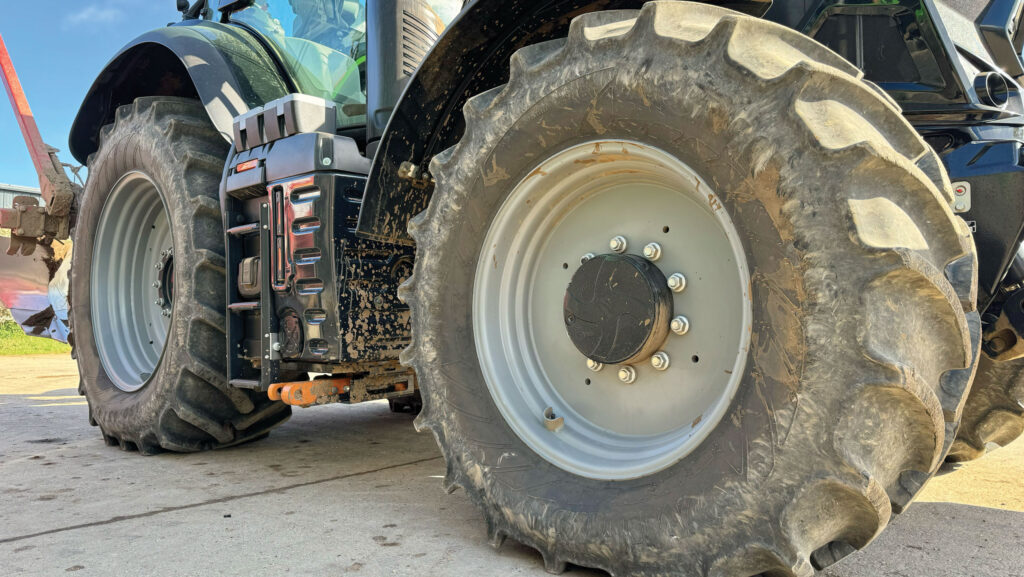
© MAG/Oliver Mark
How have they performed?
They’re ideal all-rounders for destoning, bed-forming, planting, harvesting and carting. That leaves the 8280 to do most of the land work with a 15-leg Agriweld ripper and a 3m Sumo Trio.
One of the things we’ve really noticed is how easy they are on fuel. We’ve mentioned this to Ben Burgess, our John Deere dealer, and they dispute it – but they’re yet to put forward a tractor for a head-to-head comparison.
At times, we reckon we can get an extra hour’s work from the 7250s.
They also pull extremely well and rarely find themselves short of traction. We show them very little mercy, but the six-cylinder engines always hang on when harvesting in sticky conditions.
The only problem we’ve had is with bent pick-up hitch rods.
Ironically, the issue comes when they’re greased, as they accumulate dirt and refuse to slide in and out of their sockets. For that reason, we tend to leave them running dry.
Our local dealer, Johnson Bros at Fakenham, does all the servicing while the tractors are in warranty (three years/3,000 hours).
Having separate hydraulic and transmission circuits is good in that it limits the risk of major damage should the tractor’s brakes disintegrate, but it does add to the cost of each service – particularly as genuine Deutz filters are very pricey compared with the Deere ones.
Fortunately, we’ve not yet had any major breakdowns. The only issues so far were caused by cheap AdBlue that crystallised in the exhaust.
It’s a relatively easy fix, either by removing the injector and tapping it out or stripping the whole lot down and bathing it in hot water, but the downtime is irritating.
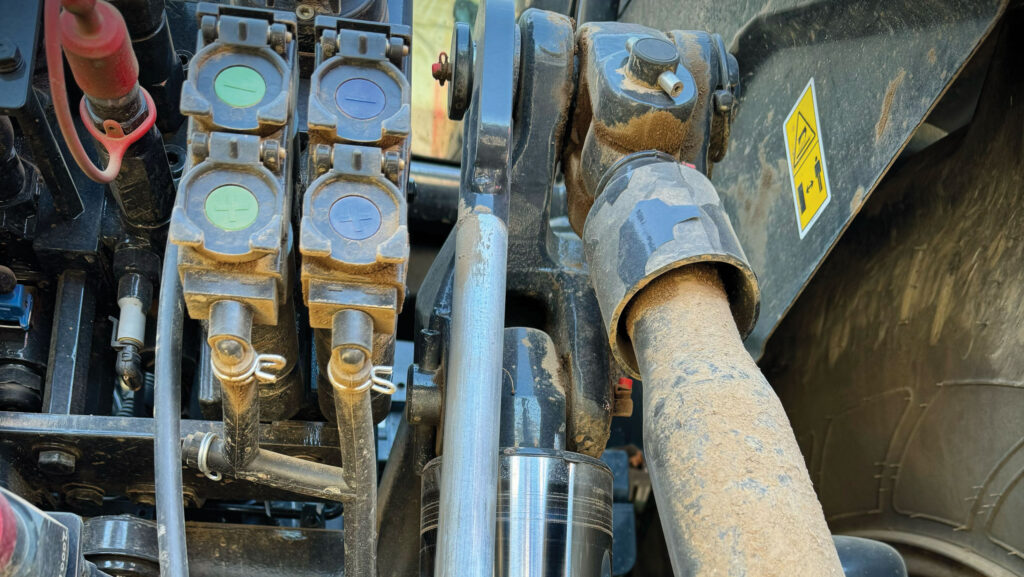
© MAG/Oliver Mark
What are the cab and controls like?
People grumble about the cab being small, but there’s a limit to how much space you need.
Relative to the Deeres, there’s more room behind the seat but less in front of it. The main issue is that the steering wheel doesn’t fold up high enough to allow anyone with a big belly to get in and out easily.
However, it’s quiet and seriously comfortable. In my view, even the older ones are smoother than the Deeres, but the new model runs rings around them all thanks to some improvements to the pneumatic cab suspension.
It’s the best ride of any tractor I’ve driven.
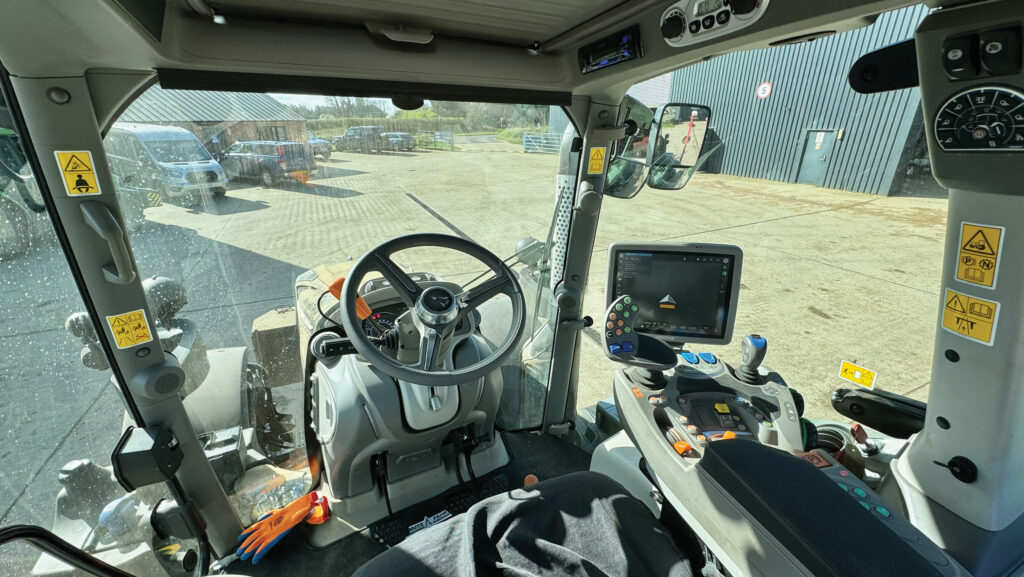
© MAG/Oliver Mark
I also like the layout of the controls. Everything is right where I need it, and the joystick is perfectly placed so that I never need to move my arm.
Once the cruise speeds and headland management are set up, I barely have to touch the pedals and can chill out with my feet up on the passenger seat.
That said, we were disappointed that Deutz had got rid of the A-pillar display on the new model. It fell right in the driver’s line of sight and was ideal for keeping an eye on spools, wheel slip and link arm position.
For some unfathomable reason, some of that information is now back in the dashboard behind the wheel.
We’d also like Deere’s climate control system. The Deutz setup is passable, but it’s got nothing on the R series – particularly when it’s 30C-plus outside.
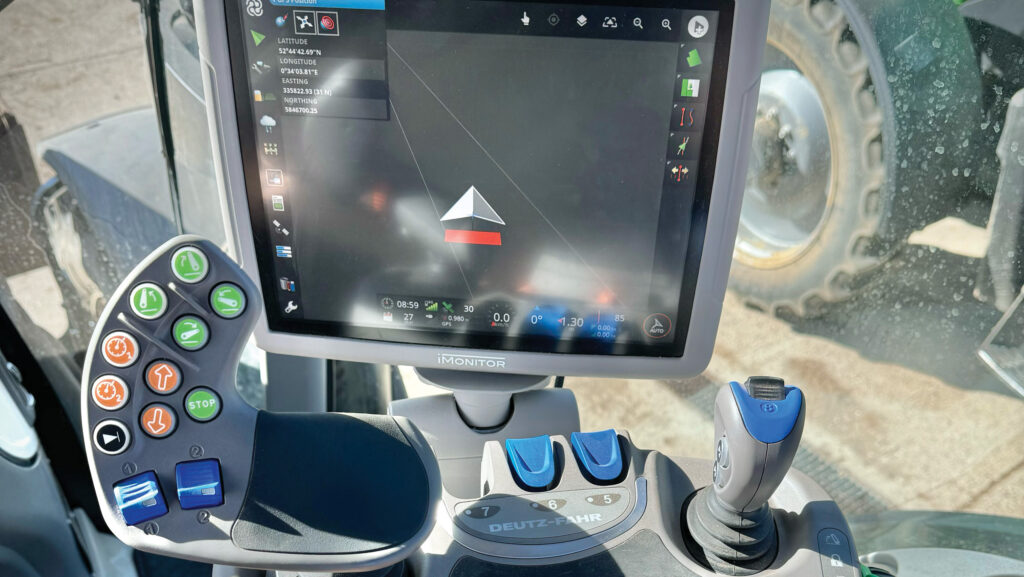
© MAG/Oliver Mark
Likes and gripes
Likes
- Relatively cheap
- Low diesel consumption
- Strong engine
- Quiet and comfortable cab
Gripes
- Drawbar mount hangs low
- Bent pick-up hitch rods
- Expensive filters
- No A-pillar display on new model
About Ian Mason Farms
Ian Mason Farms is a specialist potato contractor based in north-west Norfolk.
It grows 320ha of processing spuds annually, some sent direct to the factory and the rest held in a 12,000t storage facility at the firm’s base in Gayton, a few miles east of Kings Lynn.
As well as its seven frontline tractors, which clock between 600 and 1,400 hours a year, the fleet includes plenty of Grimme kit – three CW 150 destoners, two GB 330 planters and a pair of GT 170 harvesters – plus Rabe, Agriweld and Sumo cultivators and a Scanstone triple-bed topper.

